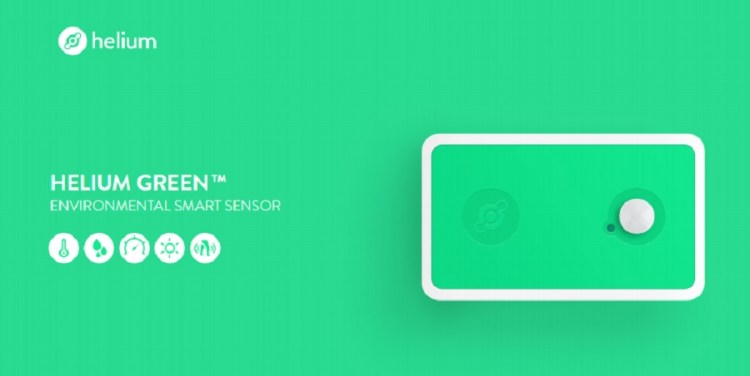Helium has raised $20 million in a new round of funding for its smart industrial sensor business. The San Francisco company has also created a new sensor, the Helium Green, for the industrial and enterprise applications of the Internet of Things, which makes everyday objects smart and connected.
The smart sensors can be used to sense temperature for sushi refrigerators or monitor the integrity of drugs or vaccines stored in hospitals. The company is making sensors for customers in healthcare, food, beverage, transportation, and grocery industries. Those sensors can monitor smart buildings, hospitals, laboratories, pharmacies, and data centers, said Rob Chandhok, president and chief operating officer of Helium, in an interview with VentureBeat. A sensor can determine if a conference room is occupied, in order to manage energy costs or monitor comfort settings.
“This investment is a great sign of the strength of our product portfolio,” Chandhok said.
The round was led by GV (formerly Google Ventures), with participation from Khosla Ventures, FirstMark, and Munich RE/Hartford Steam Boiler Ventures. GV general partner Andy Wheeler will also join Helium’s board.
“We see significant market potential for IoT in the commercial and industrial world, monitoring things like freezers for cold chain compliance, heavy equipment for preventative maintenance, and air quality inside factories,” said Wheeler, in a statement. “The Helium team has solved many of the issues that have tripped up previous industry attempts at building an IoT platform. The Helium platform has impressive technical architecture, and is easy to manage from both the edge and the cloud.”

Above: The Helium Pulse app
The Helium Green sensor can monitor temperature, humidity, barometric pressure, light, and motion. Helium also has its Helium Pulse application for the Web and for mobile devices. It enables remote monitoring and alerts so that companies can control Helium smart sensors, program alert parameters, and take other actions based on those insights. Helium Pulse is designed to save companies money, improve their efficiency, and increase customer satisfaction.
Alerts are only sent out if there’s something out of the ordinary, based on boundary conditions set by the human operator. Rather than send a lot of alerts that can create “alarm fatigue,” the Helium Pulse app triggers alerts when it determines that you have to take action. An alarm can sound if, for instance, a refrigerator is showing signs of failure. The alerts can be delivered in real time via email, text message, or app notifications.
“That fits in the category of preventive maintenance,” Chandhok said.
Helium said it is working with several of the top 10 hospitals in the U.S. To deploy the sensors, customers can just pull the smart sensor battery tab and place the sensors on a ceiling or surface. They are about the size of a deck of cards, and they operate on AA batteries, Chandhok said. Most smart sensors will last for three years on the two AA batteries.
Among many other applications, these sensors can be used for monitoring the air pressure in clean rooms or hospital operating rooms, where the pressure has to be high to prevent germs from being sucked into the room.
Chandhok said the sensors are designed to be efficient as well as smart. They won’t, for instance, send every piece of data every 15 minutes to a data center over a wireless connection. Rather, the data can be processed in the sensor itself, and information can be sent to the data center for further action if the sensor detects that something is out of the ordinary. Some photo sensors tend to work this way.
“We can compute data in the sensor for a lot less power than sending that data over a radio,” Chandhok said. “This is important when you want to send small amounts of accurate data from 10 million different sensors. We want the data to be valuable.”

Above: How the Helium network functions
Founded in 2013, Helium has raised $36 million to date and has 30 employees.
“Helium’s unique software-centric approach to smart sensing has proven to be incredibly valuable in bringing solutions to enterprise customers quickly and flexibly,” said Amir Haleem, CEO and founder of Helium, in a statement. “Today’s series B funding announcement, coupled with our amazing progress and product roadmap, positions us to transform multiple industries by introducing the Helium IoT platform at scale.”
The company previously raised $16 million in 2014 from Khosla Ventures, with participation from FirstMark Capital, Digital Garage, Marc Benioff, SV Angel, and Slow Ventures.
“There is a palpable evolution occurring in the Internet of Things industry, which will likely be led by enterprise-based solutions and applications like smart sensing,” said Bob O’Donnell, technology research analyst and founder, TECHnalysis Research, in a statement. “In fact, smart edge-based sensors, like the new products from Helium, are critical elements in some of the top Enterprise IOT applications, according to our new research on the topic.”


